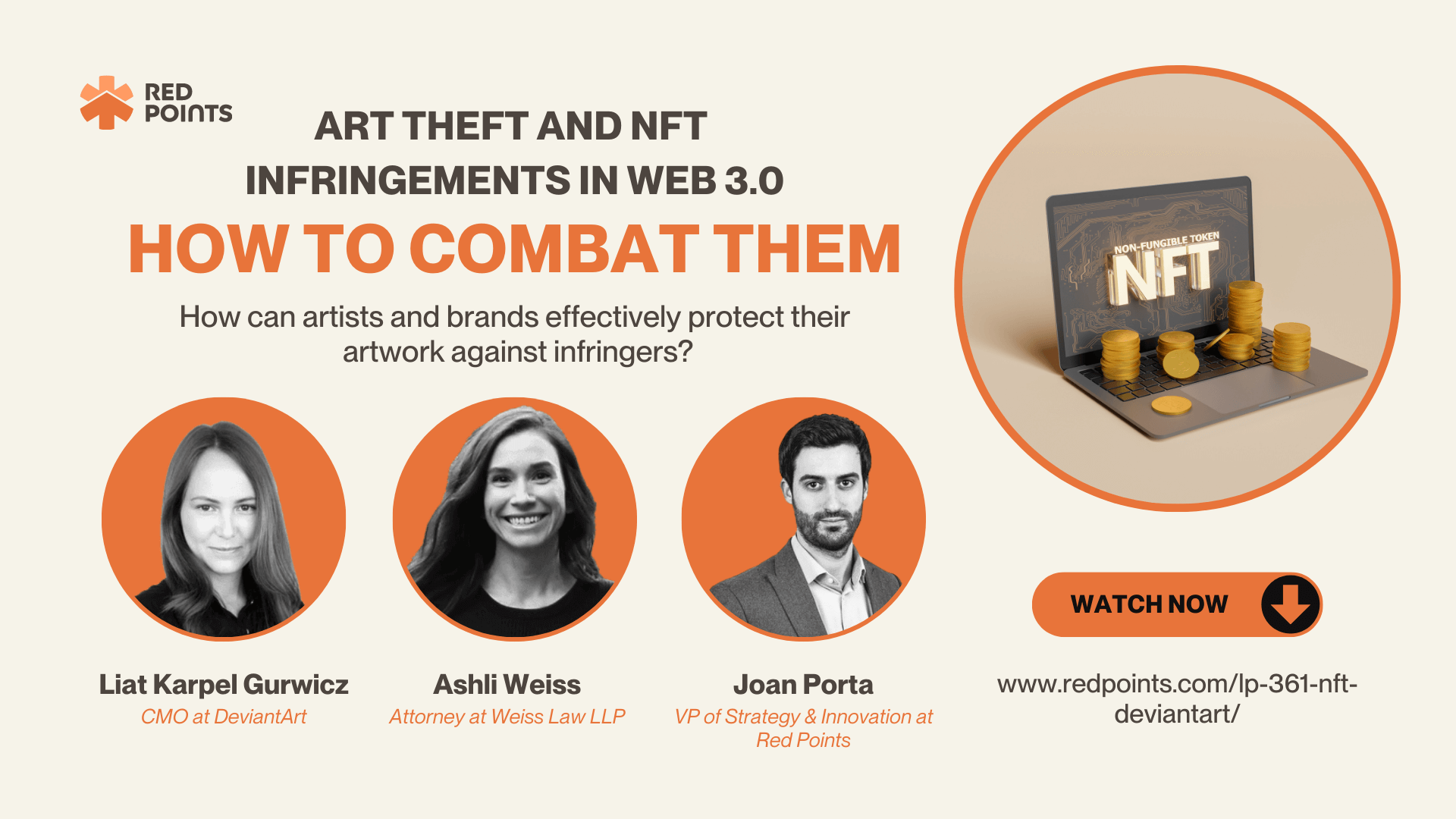
Table of Contents:
Last updated on: April 2, 2024
NFTs are becoming the hot new commodity everyone is talking about online. With investors shelling out millions in cryptocurrency to get their hands on one-of-a-kind digital content, it’s no wonder brands are starting to take part. Brands who start selling NFTs now can jump into the market with notable megahouse brands like Nike and Guccie, celebrities like Grimes, and more.
So, how can your brand get involved in the NFT market? Though these digital assets may seem complicated, selling and buying NFTs isn’t too complicated thanks to the many NFT marketplaces selling the content. We’re breaking down the 5 top NFT marketplaces to help you determine where to sell and buy NFTs for your brand.
Summary:
If you need a refresher, NFT stands for non-fungible token. NFTs can be any form of digital content and exist as completely unique pieces of content owned solely by the purchaser. NFTs are hot commodities with prices driven up by scarcity, much like art collecting, and it isn’t uncommon for an NFT to sell for millions.
While some consumers and brands have mixed feelings about the efficacy of NFTs, many household brands are already selling on NFT marketplaces. Common examples of brand NFTs include digital wearables, like Nike’s coming line of digital sneakers, graphics like Gucci’s ghost, and luxury product authentication. If you want to get in on the success of NFTs, you can create and sell them yourself.
Creating an NFT (aka minting) can be a time-consuming process if you try to code it and write it into the blockchain on your own. Luckily, many NFT marketplaces make it easy to create your NFT straight through the platform, sans coding. NFT marketplaces function like any other digital marketplace like Amazon or Shopify, only they are selling NFTs rather than physical products.
Though every NFT marketplace serves the basic function of listing and selling NFTs, there are many out there and they all have varying focuses. Some marketplaces offer a wide array of NFTs, like the biggest NFT platform OpenSea, while others are more niche and sell particular kinds of NFTs. Choosing the right marketplace for the kind of digital content your brand is planning to sell in order to run a successful NFT business.
Technically, no, you don’t need to go through a marketplace to sell NFTs. If you wanted to, it’s possible to sell NFTs through your own website or NFT marketplace. One reason someone might want to create their own marketplace is to get out of additional fees, like the 2.5% commision fee on OpenSea.
Though it may end up saving you from fees, building your own NFT marketplace will likely run you a large bill in the end anyway. It’s a complicated, time-consuming process that includes building multiple technical systems, working with blockchain, and more. Unless you’re extremely familiar with the NFT market and have a good bit of change to spend on developing your marketplace, we don’t recommend it.
When you’re just breaking into selling NFTs, you likely aren’t aware of the challenges to prepare for in building your own marketplace. Learning the system through an established NFT marketplace is a much safer option. This will allow you to get your bearings and build your audience without having to develop and run everything simultaneously.
Before we jump into the top NFT marketplaces and where you can sell your nonfungible digital content, it’s important you know some basic terminology. In the next section, we will cover the pros and cons of the top NFT marketplaces, and the following terms will be vital to understand.
Common NFT terms and their meanings:
Blockchain is the encrypted digital ledger that holds the records of transactions made throughout the network and records the purchases and sales of NFTs.
Digital wallets securely store user’s financial information and are used to store and trade cryptocurrency, like Bitcoin, necessary in the minting and selling of NFTs.
Ethereum is a blockchain as well as its own cryptocurrency, and is the most popular platform for all things NFT. They aren’t a marketplace, but rather the larger blockchain and currency platform used by various NFT marketplaces, creators, and investors.
Gas fees pay for the resources NFT marketplaces put into putting your NFT on the blockchain and validating it in the network. These fees can fluctuate depending on the activity in the NFT market.
This is a form of digital wallet used to connect your digital funds to NFT marketplaces for purchases and transfers.
The metaverse is the virtual world that exists on blockchain and allows NFT owners to interact.
Royalties are the profits paid to the NFT creator whenever it is sold to another buyer. This means NFT creators can profit on their creations long after it has sold the first time.
When it comes to finding the best marketplace to sell your NFTs, it really depends on your brand, the content you’re selling, and the audience you are targeting. NFTs, in the current moment, are all about the community that surrounds them. Choosing the right community for your brand and content will be vital to your success in selling NFTs.
While we can’t cover every NFT marketplace out there, we’ve gathered a few of the best your brand should know about. In this section, we’ll provide background on these marketplaces, along with their pros, cons, and which NFTs sell the best on their platform.
Here are the 5 top NFT marketplaces to check out:
Launching in December 2017, OpenSea was the first NFT marketplace, and remains the largest and most popular to create, sell, and buy NFTs in the world. The diverse NFT platform hosts over one million sellers that sell anything from digital art and internet content to access to virtual worlds.
OpenSea allows creators to keep ownership of their NFTs and avoid gas fees upfront by allowing NFTs to stay in user’s wallets until transfer. The platform charges a 2.5% commission fee when the NFT is sold, along with the gas fees incurred by validating it on the blockchain.
What you need to sell on OpenSea
Before signing up on the platform, you’ll first need a digital payment account like an Etherum wallet, cryptocurrency, or other valid form of currency. You’ll have to pay an initialization fee to connect your wallet and start your account, usually around $50.
To create an NFT, you can use the marketplace’s built-in program to add your digital media and prepare the content without having to code anything.
Pros:
Cons:
Rarible is a large NFT platform that, like OpenSea, features a broad range of NFTs for sale. Digital art, photography, audio, and game NFTs can all be sold on the platform, though the site heavily features digital art.
What you need to sell on Rarible
You’ll need an ETH wallet to sign up with Rarible, and you’ll also have to pay the initiation fee that comes along with it. You can create and list an NFT on the marketplace for free, but you’ll be charged 2.5% along with the buyer during the sale.
Pros
Cons
Mintable stands out from other general NFT marketplaces by being extremely easy to use, making it a great choice for NFT beginners. Where the minting process can get quite complicated on other marketplaces, it takes only a few clicks to create and list your NFT on Mintable.
It’s another platform that uses mobile wallets to make sales on digital art, audio, video, games and other collectibles. Buyers can make purchases on Mintable with cryptocurrency or their credit cards, but they’ll face a 5% fee for the latter.
Opposed to other platforms, Mintable allows sellers to choose how they will pay for gas fees when they mint an NFT. Sellers can either pay up front, followed by a 2.5% fee upon selling, or they can list for free and pay 5% when selling. Mintable also offers a unique printable item NFT category, which is charged a 10% fee of the sales price.
What you need to sell on Mintable
You’ll need to connect your digital wallet from MetaMask, Trust Wallet, or Rainbow. Once you’ve connected your wallet and created your account, it’s simple to create your NFT through the platform.
Pros
Cons
If you are an artist, or your brand sells prints and other art collectables, Nifty Gateway might be the marketplace for you. This platform is much more exclusive and works on an invite only principle, though you can apply to list an NFT on the site. If you can get into the site, you’ll be selling your NFTs with renowned artists and musicians like Kenny Scharf and Murat Pak.
What you need to sell on Nifty Gateway
You’ll again need an Ethereum digital wallet for to sell or buy on Nifty Gateway. The platform claims that you’ll pay 75% less in gas fees on the platform, though still charges a 5% transaction fee when NFTs are sold.
Pros
Cons
The newest NFT marketplace on our list, Zora launched it’s site in 2020 based on the Ethereum blockchain. Digital art is the main focus on the NFTs sold on the platform, and artists can create communities through this marketplace. They focus on helping their creators, and give them freedom to connect with the audience and community.
What sets Zora apart is that the platform doesn’t charge transaction fees to mint or sell NFTs in the marketplace. A gas fee will still have to be paid, but this will be minimal compared to other marketplace commission and fees.
What you need to sell on Zora
You’ll need a digital wallet to start an account with Zora, and the platform accepts any ETH-based wallet for your transitions. You’ll have to decide whether you want to list your NFT for auction, which only lasts 24 hours, or as a “Buy it Now” item.
Pros
Cons
NFTs can be an exciting new venture for your brand, but the NFT market doesn’t come without risk. Your artwork and entire brand can be infringed on by bad actors within these NFT marketplaces. It’s important you understand the risks NFT infringements pose so that you can protect your brand.
It’s quite easy for a bad actor to steal your copyright content or impersonate your brand in order to sell fraudulent NFTs online. This not only infringes on your content, but steals your revenue and can make it more difficult to sell your legitimate NFTs within the marketplace. If a market has been flooded with cheap fakes of your content or branded products, they won’t have as much incentive to buy your NFTs.
It’s vital to monitor these platforms in order to protect your brand and ensure that your content isn’t being stolen or your brand impersonated. Even if you aren’t yet selling NFTs, you can get ahead of infringements and ensure someone else hasn’t already cornered the market on your brand.
Choosing the best marketplace to sell your NFTs will allow you the best chance of success, and you’ll be better prepared to protect your brand. Before you even start selling your own NFTs, it’s a good idea to monitor these top NFT marketplaces for infringement. This way, you can protect your content, take back your revenue, and ensure someone isn’t flooding the NFT market with cheap fakes of your brand.
Take the next step to safeguard your content and see how you can protect your brand and keep your customers safe with Red Points.
